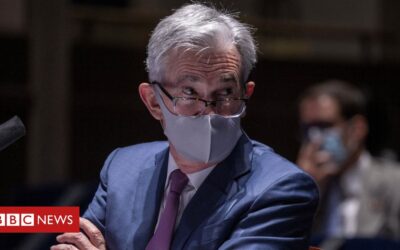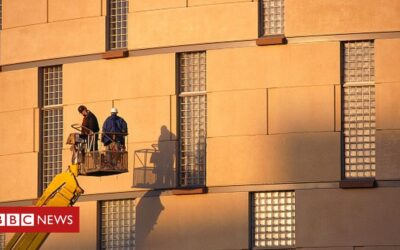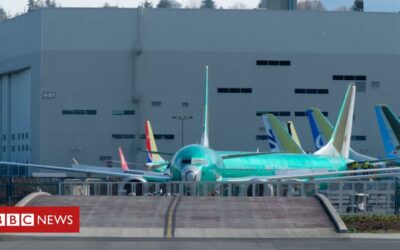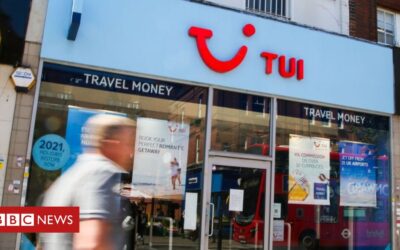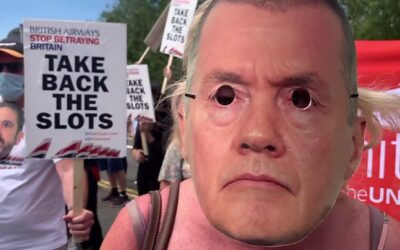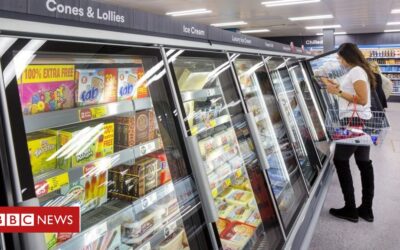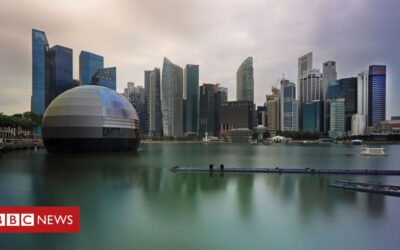Landlords have reacted with dismay to a further rent holiday for struggling businesses, saying it will hit pension schemes, savings, and lenders.The government extended the protection, which includes a moratorium on commercial evictions, on Wednesday.Business groups said the support, first introduced in April due to coronavirus, “will provide a respite” for firms.But landlords said the scheme is being “exploited” by big companies “to preserve cash flow”.In April the government announced a moratorium on evictions for non-payment of rent, which was then extended until 30 September.On Wednesday the government extended the scheme again until the end of 2020.Housing Secretary Robert Jenrick said the measures would “stop businesses going under and protect jobs over the coming months.”The government reiterated that the scheme should only be used by businesses who needed it.Business reliefThe move was welcomed by many retailers and restaurants businesses, which have been hit hard by a decline in footfall.Deliveroo boss Will Shu said the extension was “hugely welcome news for the sector and our restaurant partners.””The sector still faces huge challenges but removing the immediate threat of eviction will save thousands of restaurants from bankruptcy,” he said.Restaurants at ‘critical risk’ of evictionThe British Retail Consortium (BRC) said it is “a difficult time for store-based retailers, who face high costs from coronavirus safety measures, and significantly lower footfall.”Tom Ironside, director of business and regulation at the BRC, said: “While the extension of the moratorium will provide a respite for many struggling retailers, a large Christmas Day rent bill would be a disaster during the all-important peak trading period.”‘Pensions hit’However, the British Property Federation said the extension was “hugely disappointing”, adding that “well-capitalised businesses continue to exploit the intervention, refusing to pay rent despite being able to afford it.”Melanie Leech, the chief executive of the body, added that it is “imperative, for the health of the pensions and savings funds that own our High Street, that the government confirms this is the last extension.”The scale of pensions schemes investment in commercial property is “enormous”, according to Bruce Dear, head of London real estate at law firm Eversheds Sutherland.He said pension schemes typically invest between 10% and 12% of their funds in commercial property. Savers also invest in property through Individual Savings Accounts (ISAs).Some estimates point to about £45bn of UK savings and pensions depending on commercial rent being collected.Mr Dear said people have a “quasi-feudal” view of landlords “as being incredibly rich landowners who have nothing to do with people… but the majority of landlords in this country are you and me, through our savings and our pensions.” “The dance between landlords and tenants drives the UK economy and it doesn’t work if one side has its feet chained together. The government should bring in counter balancing rent support for landlords,” he added.Credit squeeze?Industry body Revo, which represents commercial landlords, said that the shortfall in rents for the second quarter alone was £1.5bn, and that can “be expected to increase sharply later this month.””This sudden loss of income will reverberate through the financial system to savers and pensioners that directly or indirectly rely on commercial property for income… The current situation is simply not sustainable,” said Vivienne King, chief executive of Revo.The body added that landlords could start to have difficulty paying their mortgages, which in turn would hit banks, who may then be less willing to lend.The loss of rental income “may begin to have material impacts on credit supply, if lenders find themselves overwhelmed by defaulting landlord borrowers,” Ms King said.
BBC Business News Articles
Fed vows prolonged economic support for US
The US central bank has pledged to continue its support for the US economy for several years, as households and businesses slowly recover from the impact of the coronavirus pandemic.Most Federal Reserve leaders said they expected to keep interest rates near zero for at least the next three years.Fed Chair Jerome Powell said officials did not expect to change course until the recovery was “very far” along.He also warned the rebound could be at risk without more government spending.Following the bank’s September meeting, Mr Powell said government aid for businesses and workers hurt by coronavirus had been “critical” to a better-than-expected recovery so far.Outlook changeProjections released on Wednesday showed bank leaders expect the US economy to shrink by 3.5% this year – less than the 6.5% decline feared in June.They also said they expected the unemployment rate to fall to about 7.6% by the end of the year, lower than previously anticipated.But Mr Powell warned the recovery could falter, unless politicians approve additional aid.”The real question is when and how much and what will be the content and no one has any certainty around that,” he said. “If we don’t have that, then there would certainly be downside risks.”Trump call for stimulusMr Powell’s comments came as lawmakers in Washington remain at an impasse over further spending, with Democrats calling for more aggressive action than many Republicans support.In a tweet, President Donald Trump on Wednesday urged his party to back “much higher numbers” for aid.However, he has largely dismissed economic warnings, saying the US is doing “unbelievably well” and seizing on signs of recovery to make his case as he campaigns for re-election in November.Polls show a majority of Americans still approve of the president’s handling of the economy, but views of the economy have soured sharply since the pandemic.Output in the US shrank by more than 9% between April and June. While not as severe a decline as in many other countries – in the UK, the economy contracted by more than 20% – last month’s jobless rate of 8.4% remained more than double the February level. Nearly 30 million Americans continue to collect unemployment benefits.Fed response to pandemicThe Federal Reserve has taken what Mr Powell described as “forceful” steps in response, including dropping interest rates near zero and buying roughly $2tn in US government debt.Last month, the bank also said it was relaxing its approach to managing inflation, targeting potentially higher price increases to try to stimulate growth and bolster employment.On Wednesday, the bank confirmed that shift, saying it expected to leave interest rates near zero until inflation was “on track to moderately exceed” its 2% target “for some time”.Fed relaxes inflation target in policy shift
The Fed’s four radical moves to save the economy
Mr Powell on Wednesday said he hoped the bank’s “highly accommodative” stance – keeping interest rates low and supporting borrowing with ongoing securities purchases – would serve as a “powerful tool” to spur economic activity over time.”This is the kind of guidance that will provide support for the economy over time,” he said.But he has repeatedly said the bank’s powers to address the current crisis are limited and urged Congress to approve further aid.Dr Kerstin Braun, president of Stenn International, a UK-based trade finance provider, said Mr Powell “has done what he can to stop economic freefall”.”The US economy is crying out for fiscal stimulus given how uneven the pandemic’s impact has been across a whole range of sectors – the economic rebound simply cannot be wholly organic,” she said. The Fed is operating “in the dark” amid so much political and economic uncertainty, said Neil Wilson, chief market analyst at Markets.com.”All the Fed can really do is continue to stress its willingness to do whatever it takes and its willingness to overlook overshoots on inflation should they emerge,” he said.
PlayStation 5 matches the price of the Xbox Series X
image copyrightSonySony has matched the price of the forthcoming flagship PlayStation 5 to that of Microsoft’s Xbox Series X. Last time round, the PS4 significantly undercut the Xbox One at launch.Sony also confirmed the PS5’s “digital edition” – which does not have a disc drive – would cost about 40% more than the low-end Xbox Series S.Both PS5 consoles are set to be released on 19 November in the UK, and 12 November in the US, Japan and Australia.That puts them slightly later than Microsoft’s 10 November launch date.image copyrightSonySony was the clear leader in the previous generation of the so-called console wars.The various PlayStation 4 consoles outsold the Xbox One range by a factor of more than two to one.But the £449/$500/€500 cost of the Japanese firm’s new top-end machine and £360/$400/€400 price of the digital edition means it may be a closer battle this time, at least to begin with.Some industry-watchers believe Microsoft’s combination of a £250 price for the XBox Series S and the value offered by the Xbox Game Pass subscription service could give the US firm an advantage.Microsoft offers members its first-party blockbuster games at launch in its games library, unlike Sony’s existing PlayStation Now services, which is limited to older major releases.Sony showed off a new subscription service called the PlayStation Plus Collection for the PS5.image copyrightSonyBut it appeared to focus on the PS4’s greatest hits – including Last of Us Remastered, God of War and Bloodborne – rather than any of the PS5’s forthcoming releases.”Microsoft has a really appealing offering with the Xbox Series S pricing at just £250, and Sony doesn’t really have an answer to that for people who just want the cheapest possible entry point to next-generation gaming,” video games journalist Laura Dale told the BBC.”However, people who want to play any of Sony’s first-party franchises are unlikely to be swayed to Xbox just because it’s cheaper.”One key difference between the two companies’ strategies is that the Xbox Series S delivers lower-resolution graphics than the Series X because it has less powerful components, while Sony has opted only to remove the Blu-ray drive from its entry-level machine.On that basis, its marketers may still argue it provides a better-value way to experience the full power of what next-generation games can deliver.image copyrightFinal Fantasy/PlayStationEven so, it is likely Sony will instead focus its appeal on the draw of its “console exclusive” titles.To that end, during its latest virtual event it showed trailers and gameplay for:Final Fantasy XVI – the latest entry in Square Enix’s series, which appears to be set in a medieval world this time round after the sci-fi-themed last titleMarvel’s Spider-Man: Miles Morales – including a lengthy battle with super-villain The Tinkerer on a bridgeDeathloop – an assassin-themed shooter in which time repeats, helping players learn how best to hunt their targetsSony also teased its forthcoming God of War sequel Ragnarok, which it said would be released next year, but only showed off an animated logo.”It is possible that PS5 will have launched three console-exclusive titles before Xbox Series X manages to launch its first – Halo Infinite, with no date in 2021 specified as of yet,” said Louise Shorthouse, a games analyst at Omdia.”Consumers also tend to stick with the same console brands across generations, so Sony is in an incredibly strong position.”Many of the games on show had been previewed at an earlier event in June.image copyrightWarner Bros/PlayStationBut there was also a first look at the much anticipated Harry Potter spin-off Hogwarts Legacy. The role-player game will be a cross-platform release in 2021.Facebook boosts power and cuts price of Oculus Quest VR headsetXbox blinks first by pricing Xbox Series X ahead of PS5Marvel’s Avengers: Gaming can be ‘more personal’ than movies”The two higher-spec consoles are close to each other in terms of specification – the Xbox has more storage, but the PS5’s is slightly faster,” said Nicky Danino, a gaming expert at the University of Central Lancashire.”But there are still reasons why people will pick a specific console. What platform your friends play on, for example, is highly influential.”It looks like Sony is almost trolling arch-rival Microsoft by matching the PS5’s price to that of the Xbox Series X.The gambit will have surprised many industry observers.Xbox felt forced to reveal its prices last week following a leak. And this seemed to gift PlayStation a second-mover advantage.But when I spoke to PlayStation’s chief executive Jim Ryan, he was adamant that the PS5’s price points had been set since the beginning of the year. Likewise, he said, today’s announcement had been in his diary for some time.On paper the Xbox Series X is the more powerful machine.But PlayStation has a solid line-up of platform-exclusive titles.And the delay to Halo Infinite – after fans complained that footage shown earlier in the year was underwhelming – has been a big blow to Microsoft’s original launch plans.But is the PS5 fighting the last generation’s console war? Xbox has a compelling offer with its Game Pass Ultimate subscription service. So even if Xbox doesn’t sell as many physical consoles as PlayStation, it may still prove to be at least as profitable.When I questioned Mr Ryan about the possibility of a similar service, he said PlayStation was about big blockbuster games that cost a lot to make, so a similar subscription service model would not make financial sense.We will find out whether he sticks to that strategy in 2021 or beyond once supply meets demand.Related TopicsGamingSonyMicrosoftXboxPlayStationMore on this story
Cladding red tape 'stops people selling homes'
Young and vulnerable people are stuck with homes they can’t sell because of red tape around cladding, a leaseholders’ charity says.Many high-street lenders ask for an EWS1 form as proof that cladding is safe but leaseholders say they are struggling to get hold of the form.The Leasehold Knowledge Partnership says cladding problems have blocked tens of thousands of flat sales.The government says the forms are often not needed for low-rise buildings.After 72 people died in the Grenfell Tower fire in 2017, the government pledged safe alternatives to dangerous cladding would be provided on all buildings taller than 18m by June this year.But the public accounts committee says only 155 out of 455 high-rise buildings with similar cladding to Grenfell have had it replaced. A new target to complete the work has been set for the end of 2021 but the committee of MPs says the delay has resulted in thousands of people being “condemned to lives of stress and fear”.Valeria Martorelli bought her shared ownership flat in a low-rise block in London two years ago, aged 26.She owns 35% of it, with a housing association owning the rest.When she put the flat on the market after getting a new job in Belfast, she was told lenders would need to see an EWS1 form in order to give buyers a mortgage.But the managing agents of her block said they could not get the work required to make the cladding safe for “up to five years”. She told Radio 1 Newsbeat: “I had five buyers interested none of them are going ahead.”I just hope someone will step in.”Banks said the type of cladding on her building could be dangerous, despite it only being built in 2007. Without further inspection it’s difficult to know how much work is needed and Valeria is worried the cost of fixing the cladding will be more than the proportion of the flat she owns.The Building Safety Act is a new set of laws being discussed, which the government hopes will prevent future cladding problems and fix current ones. Yet campaigners are concerned too much money is being asked of the leaseholders, who often, like Valeria only own part of the flat.”I would lose all of my £30,000 deposit to get rid [of the flat]” she says, “if I could I would do it today”.She says her only hope is a cash buyer but they are offering much less than she paid.”Cash buyers are investors and they always want to get a bargain. “But now because they know of the cladding issues, they offer even less, as they know we are desperate and they want to exploit this desperation”.Is this the end of the bank of mum and dad?There are reportedly only 291 people who are qualified to carry out the tests needed for the EWS1 form. But the government department responsible for housing told Newsbeat that claims around who needs one have become “misleading”.An Ministry of Housing Communities and Local Government spokesman said: “We know many leaseholders are being asked for EWS1 forms when they shouldn’t be – if buildings are under 18m or without cladding, an EWS1 should not be necessary.”The government wants lenders to accept other evidence that a building is safe, saying they are: “looking at what else we can do to support leaseholders who find themselves in this situation”.The Leasehold Knowledge Partnership estimates there are 2.8m flats in England and Wales that need some form of confirmation that they are safe.”A quarter of leaseholders sales are falling through due to cladding” says Martin Boyd from the charity.”Covid has simply made what was a bad situation more difficult as the pressures of moving financially increase”.He says many of the people affected are first time buyers or in shared ownership schemes, who are now stuck with huge fees to fix the problems in their buildings.Follow Newsbeat on Instagram, Facebook, Twitter and YouTube.Listen to Newsbeat live at 12:45 and 17:45 weekdays – or listen back here.
Boeing's 'culture of concealment' to blame for 737 crashes
Two fatal crashes of Boeing 737 Max aircraft were partly due to the plane-maker’s unwillingness to share technical details, a congressional investigation has found. It blames a “culture of concealment” at Boeing, but says the regulatory system was also “fundamentally flawed”.Boeing said it had “learned many hard lessons” from the accidents.But families of the victims accused the company and the regulator of continuing to hide information.The US report is highly critical of both Boeing and the regulator, the Federal Aviation Administration (FAA).”Boeing failed in its design and development of the Max, and the FAA failed in its oversight of Boeing and its certification of the aircraft,” the 18-month investigation concluded.The Boeing 737 Max has been grounded since March 2019 after two crashes, in Indonesia and Ethiopia, caused the deaths of 346 people.The nearly 250-page report found a series of failures in the plane’s design, combined with “regulatory capture”, an overly close relationship between Boeing and the federal regulator, which compromised the process of gaining safety certification.”[The crashes] were the horrific culmination of a series of faulty technical assumptions by Boeing’s engineers, a lack of transparency on the part of Boeing’s management, and grossly insufficient oversight by the FAA.””Cost-cutting… that jeopardised the safety of the flying public”, a “culture of concealment” over issues with the aircraft, “troubling mismanagement misjudgements” – just a snapshot of the stinging charges against Boeing. But the US aviation regulator, the FAA, comes off almost as badly. US representatives find it guilty of “inherent conflicts of interest” and “grossly insufficient oversight”. More seriously, they say the regulator was, in effect, in Boeing’s pocket and that the FAA’s management “overruled” its own technical and safety experts “at the behest of Boeing”.Boeing admits “mistakes were made” and it now wants to focus on getting the 737-Max back in the air, saying the “revised design” of the aircraft has been “thoroughly scrutinised”.Regulators in Europe and the US are relatively close to recertifying the 737-Max. But this is one of the biggest safety scandals facing a private company in modern times. And other investigations are outstanding, including a giant lawsuit from the relatives of those killed in the second crash in Ethiopia. Boeing said it had made “fundamental changes” to the company as a result of the accidents. The FAA said it would work with lawmakers to “implement improvements identified in the report”.The report said Boeing had failed to share information about a key safety system, called MCAS, designed to automatically counter a tendency in the 737 Max to pitch upwards. Boeing was at fault for “concealing the very existence of MCAS from 737 pilots”, it found.MCAS was not in crew manuals and Boeing sought to convince regulators not to require simulator training for Max pilots, which would incur extra costs.The MCAS system has been blamed for both crashes that came within months of each other, shortly after the plane went into operation.’Halt the process'”The FAA should immediately halt the recertification process for the 737 Max in light of this report,” said Michael Stumo, whose daughter Samya Rose Stumo died in the Ethiopian crash in March 2019.”The FAA and Boeing hid information before and are doing it again,” he added.”Both Boeing and the FAA have refused to provide their data that support their efforts to unground the plane. The Max should not fly until Boeing and the FAA provide this data, so independent experts and the public can confirm the aircraft is safe.”British national Zipporah Kuria, whose father was killed in the same crash, said it would be “grossly irresponsible” to recertify the 737 Max.”My heart is shattered. My dad lost his life and I lost him,” she said “If I’d lost him because of a faulty sensor, I may have come to accept it as an incident, but I lost my dad to greed, corruption and lack of human decency. “This is why we need to axe the Max. The public shouldn’t continue bearing the cost for corner-cutters who do not seem to have a conscience.”‘Captured’ regulatorPaul Njoroge of Canada, whose entire family was killed on their trip to Kenya to visit grandparents, said the report documented “clear dereliction of duty by Boeing and the FAA in the design and certification process of the 737 Max”.”It is, therefore, clear that at Boeing, safety comes after cost-cutting, profit-maximisation and share price pumpage,” he added.”Further, the report has undoubtedly cast the FAA as a ‘captured’ regulator – the FAA is therefore an agency promoting Boeing and the industry, instead of promoting the safety of the flying public.”Regulators around the world are currently putting the modified 737 Max through its paces.The FAA began test flights in June, while the European Union Aviation Safety Agency (EASA) started its own testing programme earlier this month.EASA has maintained that clearance by the FAA will not automatically mean the plane is considered airworthy in Europe.”Once the FAA and other regulators have determined the Max can safely return to service, it will be one of the most thoroughly scrutinised aircraft in history, and we have full confidence in its safety,” Boeing said.
Coronavirus: Tui to clear refund backlog by end of September
Travel company Tui has promised to clear a backlog of refunds by the end of the month following an investigation by the UK’s competition authority.The Competition and Markets Authority (CMA) had received thousands of complaints from customers waiting many weeks for their money back.Refunds for cancelled package holidays should be completed within 14 days.Holidays plans were ruined by the coronavirus outbreak, and delays over refunds added to frustrations.Following the CMA investigation, Tui said it would clear outstanding refunds by 30 September.The promise covers all of Tui UK’s different businesses that offer package holidays, including First Choice, First Choice Holidays, Marella Cruises, Crystal Ski, Crystal, Tui Scene, Tui Lakes and Mountains, and Skytours.’No excuse’Roy Parry, of Wigan, had booked a £2,500 Tui holiday to Barbados to celebrate the end of his chemotherapy treatment in April.After the holiday was cancelled because of the coronavirus pandemic, he said he spent hours on the phone to Tui, trying to claim a refund. Eventually he was credited by his credit card provider. Tui later contacted him to offer a refund which he declined, but then the credit card company asked for the money back. “It was a lot of hassle,” Mr Parry said. “If Tui had done what they should have done and refunded people at the time, people wouldn’t have been in that situation.”There’s enough difficulty in the world as it is. Tui added to that. They said it was a Covid issue. I don’t buy that. I work in telecoms, we were getting things sorted within days.”I don’t think you should use the Covid for an excuse for not behaving the way your customers expect a seriously large company like them to behave.”Customers who received Refund Credit Notes will also be contacted to be told they are entitled to cash refund instead, which would be provided within 14 days.Andrea Coscelli, the CMA’s chief executive, said: “It is absolutely essential that people have trust and confidence when booking package holidays and know that if a cancellation is necessary as a result of coronavirus, businesses will give them a full, prompt refund. “The CMA is continuing to investigate package holiday firms in the context of the Covid-19 crisis. If we find that businesses are not complying with consumer protection law, we will not hesitate to take further action.”Package holiday firms told to sharpen up on refunds
Tui: Holiday bookings for next summer jump 145%
It has been a tough period for the sector and for Tui. In late July, the company said it would shut 166 High Street stores in the UK and Ireland. Bookings plunged 81% for the summer and were 40% lower for a scaled-back winter programme.However, bookings are more positive for next year as holidaymakers pland ahead in the hope of an easing of pandemic restrictions.What are my rights?If you have a package holiday cancelled by the provider, then a refund should be provided for the whole holiday within 14 days
If your flight is cancelled, you are entitled to a full refund to the original form of payment within seven days, although many airlines are struggling to meet that deadline. You can accept, or refuse, vouchers or a rebooking but a voucher will probably be invalid if the airline later goes bust
If you decide against going on a future flight, which is not yet cancelled, then there is no right to a refund. Different airlines have different rules over what you can do, but many are waiving any charges for changing to a later flight or having a voucher instead. Your travel insurance is unlikely to cover you
Coronavirus: Hit to global economy 'will be less than expected' in 2020
The damage to the global economy this year will be less than previously expected, but still “unprecedented”, a leading international body says. The Organisation for Economic Cooperation and Development now predicts a decline of 4.5% in 2020, versus the 6% drop forecast in June.It means it no longer expects the UK to have the deepest contraction of the major G20 economies this year.But the 10.1% drop would still make Britain one of the hardest hit. The revision for 2020 is favourable, but even so, the global economy is facing damage that the OECD describes as “unprecedented in recent history”. The agency’s chief economist Laurence Boone said “there is no way to sugar coat it”.It may be “less bad than we expected” she said, “but it is not a good outcome”.Asia sees first regional recession in 60 years
Pandemic pushes US into official recession
For this year, the new forecast for Britain is a contraction that is less severe by 1.4 percentage points. In the OECD’s previous forecasts, published in June, it gave two scenarios for how the pandemic might unfold. For what it called the single hit scenario, the economic decline for the UK was 11.5%, the biggest hit of any country covered by that forecast. The new revised figures predict several countries, including Italy, India and South Africa will experience contractions larger than the UK’s.The report says that the declines would have been substantially larger had it not been for what it calls the “prompt and effective policy support introduced in all economies”. Weaker rebound in 2021It says the support needs to be continued next year and governments should avoid “premature budgetary tightening at a time when economies are still fragile.”Consumer spending on durable goods, including cars, has rebounded quite strongly the OECD says. But it has been subdued for services which involve social interaction or international travel.For next year, the OECD is now predicting a slightly weaker rebound for the global economy. For Britain the downward revision is relatively large, with growth now predicted at 7.6%, leaving the economy still smaller than it was in 2019. The 2020 forecast reflects an assumption that the UK and the EU will agree a basic free trade agreement.For the global economy, the agency’s chief economist said that the loss of economic activity due to the pandemic by the end of 2021 would be equivalent to the combined annual gross domestic product of France and Germany.
BA boss says there is no need to fire and rehire staff
There is no need for British Airways to lay off cabin crew and then rehire them on inferior terms, boss Alex Cruz has said.Unions and MPs had accused the airline of following a “fire and rehire” policy, which saw some employees facing pay cuts of up to 50%. But Mr Cruz told MPs “there will be no need to issue new contracts”, subject to staff approval.BA reached the outline of a jobs agreement with union Unite last week.The pair have been in a bitter dispute over BA’s plans to shed up to 13,000 jobs and cut pay, amid a collapse in demand for air travel.Speaking to the Transport Select Committee, Mr Cruz said it was a matter of “regret” that it took 73 days for BA’s non-pilot unions to sit down and negotiate. But Labour MP Sam Tarry responded: “I would argue that if you hadn’t put a metaphorical gun to their head then that might not have happened.”
Media playback is unsupported on your device
Mr Cruz said the airline would now follow the “standard methodology” of union agreements and make amendments to existing the contracts. Details are still being worked out and ballots of some staff are yet to be held. Long-serving cabin crew members face a 15% pay reduction, while hoping to retain many of the allowances which constitute a significant part of their overall pay. “We have reached agreements in a majority of areas,” Mr Cruz said. “We very much hope that the result of the ballots will be to accept those ballots.” ‘Devastated business’In relation to whether or not BA will have to make 13,000 staff redundant, Mr Cruz said that the company didn’t “need to get to that number”.However, a large number of long-serving cabin crew have taken voluntary redundancy and many staff felt that the terms being offered at the time meant that was their only choice.Mr Cruz told MPs that the pandemic had “devastated our business… and we’re still fighting for our own survival”.Last week the airline flew about 187,000 passengers – about 25%-30% of its normal flight schedule. “Everyone is facing decisions we never wanted to face,” Mr Cruz said.He said he had taken a 33% pay cut during the pandemic, reducing his salary from the £805,000 he earned in 2019.But he refused to comment on an £833,000 bonus paid to the outgoing boss of BA’s parent company, Willie Walsh. IAG faced a backlash from shareholders over that payment to Mr Walsh who left the company last week.
Iceland challenges supermarket rivals to publish 'plastic footprint'
Frozen food retailer Iceland has published its own “plastic footprint” and is calling on other grocery chains to do the same.It says greater transparency over how much plastic is used in packaging and transporting food will lead to a reduction in plastic waste.All major chains are cutting back on plastics use.But Iceland is asking the government to make reporting on such use mandatory and to set targets for its reduction.The chain used 32,000 tonnes of plastic in 2019.”Without transparency, and government enforced reduction targets, we will not be able to judge whether business actions are delivering real progress,” said Richard Walker, managing director of Iceland.Supermarkets have come under increased pressure in recent years to reduce plastic use. Consumer awareness of the environmental impact of discarded packaging has risen sharply, in part due to the “Blue Planet effect” after a BBC television series highlighted plastic pollution in the oceans.Wildlife in ‘catastrophic decline’, report warns
UK ‘has double standards’ on banned pesticides
All the large chains have made pledges and some moves to reduce plastic: Morrisons is introducing paper bags for shoppers in its stores, Sainsbury’s removed plastic bags for its loose fresh produce last year, and Tesco said it would stop using plastic bags for its online deliveries.However Mr Walker criticised rival firms for misrepresenting their moves to become more sustainable.”For several years now, businesses have been using incomplete information to represent the scale of their plastic packaging, their commitments to change, and the progress being made. We will all be better served by a more accurate and transparent picture on this issue,” he said.’Bold move’Iceland’s call for greater transparency is supported by a range of campaigning organisations including Friends of the Earth and Greenpeace who said if firms were required to publish detailed figures and hit targets it would force them to tackle the problem.”UK supermarkets are starting to cut the amount of single-use plastic packaging they produce, but we need them to move faster and think bigger. The government can make a big difference by setting legally binding targets,” said Greenpeace UK plastic campaigner Nina Schrank. A Plastic Planet co-founder Sian Sutherland said: “For years UK supermarkets have been hiding behind half-truths and incomplete data, never fully disclosing the enormous scale of the plastic within their own businesses.”This bold move by Iceland must quickly be adopted by all UK retailers. If the retailers use their collective might, the brands will soon have to follow and we will finally see some real plastic reduction rather than yet more pacts and pledges,” she added.Iceland has made a commitment to eliminate all plastic packaging from its own-label products by the end of 2023 and says publishing its plastic footprint every year will help it achieve that goal. It said two thirds of the plastic packaging it currently uses is related to branded goods which are outside its control.Iceland itself came in for criticism last year after a BBC investigation revealed it still had stock containing palm oil on its shelves after it had claimed to have stopped selling any own-label items containing the product. Iceland still selling own-brand palm oil
Iceland removed own label from 17 palm products
It also removed its own-label branding from some products after it failed to meet the deadline for the removal of palm oil from their ingredients.Palm oil production is responsible for the loss of large areas of rainforest, contributing to the climate change crisis.
Singapore becomes hub for Chinese tech amid US tensions
Some of China’s biggest technology firms are expanding operations in Singapore as tensions rise between Washington and Beijing. Tencent and Alibaba are increasing their presence in the city state while TikTok owner ByteDance is reported to be investing billions of dollars. Considered neutral territory, Singapore has good ties to both the US and China.Relations between Washington and Beijing are growing increasingly hostile, particularly over technology.Tencent announced this week it was “expanding its business presence in Singapore to support our growing business in South East Asia and beyond”.The new regional office is described as a “strategic addition” to its current offices in South East Asia.Tencent’s WeChat messaging app is facing a ban this month in the US, along with TikTok, under the Trump administration’s clampdown on Chinese apps and tech firms.Donald Trump has already imposed bans on Chinese telecoms firm Huawei.”Given the US-China tensions in tech and the heightening risk of decoupling, it makes sense for Chinese tech companies to separate operations in China and outside of China,” said Tommy Wu at Oxford Economics.”Singapore would be an ideal location given the city state’s comparative advantage in tech, its geographic proximity to China and as an innovation hub in South East Asia.”Singapore has always been seen as a regional base for Western firms because of its advanced financial and legal system. Now it’s firmly on the radar of Chinese companies.The political turmoil in Hong Kong and the introduction of China’s controversial national security law has seen many firms look for a more stable business environment within Asia.Masking ChinaBut there is another reason why Singapore is so attractive to China, according to Nick Redfearn, deputy chief executive at UK-based consultancy Rouse. It could explain why the city state has attracted so much foreign direct investment (FDI) compared to other South East Asia countries he said.”This is usually because regional headquarters, operating on behalf of parent companies, act as the foreign investor in countries such as the Philippines, Indonesia, Vietnam and elsewhere. “This can help Chinese companies avoid the appearance of Chinese investment,” he said.South East Asia overtook the EU to become China’s largest regional trading partner in 2020, according to Mr Redfearn.Global footprintRui Ma, a Chinese tech expert and investor, added: “You’ve seen Western companies (Google, Facebook, LinkedIn and many more) make it their Asia Pacific headquarters for a while now, so it’s natural Chinese companies also consider it for the same reasons. “I think the recent US-China geopolitical tensions only make it even more attractive, but that’s not the only or primary reason.”She says globalisation is another driving force. “If Western companies can be global, why can’t we? “Chinese companies are very much willing to invest for the long term and are not going to be content to be left behind when it comes to future opportunities.”


